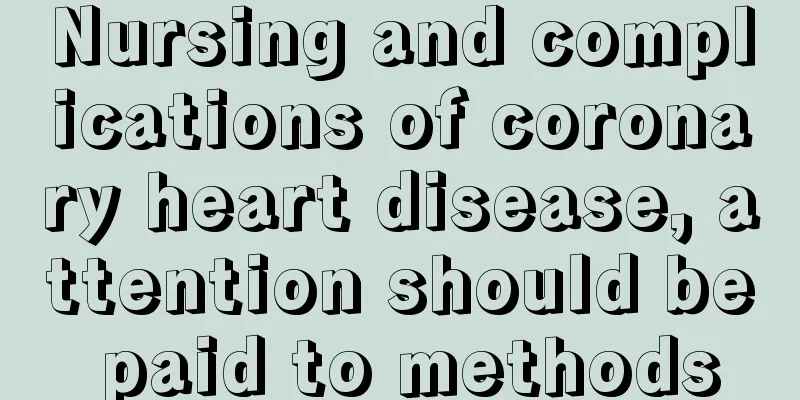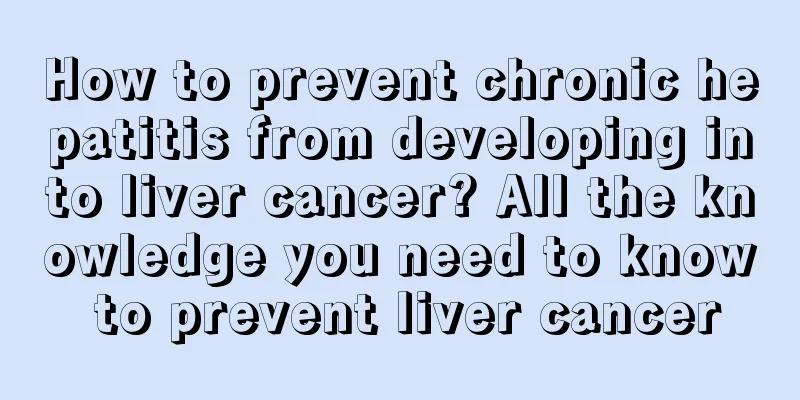Nursing and complications of coronary heart disease, attention should be paid to methods

|
Although coronary heart disease is a well-known and relatively familiar disease, not many people really understand it. Their knowledge is only superficial, and they don't know much about the symptoms and care of coronary heart disease, which can easily endanger our lives. But it doesn't matter if you don't know, let's learn about it together below. Complications of Coronary Heart Disease In our lives, I believe many of us know that many diseases have complications, and coronary heart disease also has complications. So what are the complications of coronary heart disease? Let’s take a look at them below. 1. Heart rupture It often occurs within 1 week of myocardial infarction, mostly due to rupture of the ventricular free wall, resulting in pericardial effusion, acute cardiac tamponade and sudden death. 2. Embolism It is caused by the detachment of thrombus attached to the left ventricle wall, leading to embolism of arteries such as the brain, kidneys, spleen, or limbs. 3. Ventricular aneurysm This symptom mainly occurs in the left ventricle, and when examined, it will be found that the left heart border becomes larger and the fluctuation range of the heart gradually increases. 4. Post-myocardial infarction syndrome It occurs within weeks to months after myocardial infarction and may recur, manifesting as pericarditis, pleurisy or pneumonia, with symptoms such as fever and chest pain. It may be an allergic reaction of the body to necrotic substances. 2. Nursing measures 1. When angina pectoris occurs, you must stay in bed and rest, be closely monitored, and keep the environment quiet. 2. Understand the patient's psychological state, eliminate negative emotions, avoid various inducements, and strengthen daily care. 3. When angina pectoris occurs, stop activity immediately and take nitroglycerin sublingually. Observe the adverse reactions of anti-anginal drugs. For example, the use of nitrites often causes symptoms of vasodilation such as headache, head swelling, flushing, and dizziness. People who are sensitive to this drug are prone to orthostatic hypotension. 4. Patients with coronary heart disease cannot smoke or drink. In terms of diet, they should pay attention to eating foods that are low in fat, low in cholesterol and high in vitamins. They should eat light foods and not eat too much at one time. 5. The room temperature should not be too cold or too hot, because cold and heat will increase the burden on the heart and make angina pectoris more likely to occur. 6. Give oxygen inhalation, 3-4 L/min. 7. After the pain stabilizes, you can do appropriate physical activities. |
<<: How to treat high urine protein, people need to pay attention
>>: Antimicrobial therapy is critical in the treatment of pediatric sepsis
Recommend
Does stomach bloating without pain mean stomach cancer?
Does stomach bloating without pain mean stomach c...
There is a hard piece of meat on my shoulder, what should I do?
If there is a piece of meat in the shoulder area ...
What are the early symptoms of cervical cancer? What are the common symptoms of cervical cancer?
Cervical cancer is a common female disease that i...
How is prostate cancer staged? There are four stages
Prostate cancer is divided into four stages. Pati...
What is the sweet taste in the mouth
What causes a sweet taste in the mouth? The sweet...
How to prevent bladder cancer
Bladder cancer has a high incidence in our daily ...
The correct method and steps to take body temperature
When we suffer from diseases that affect the enti...
What to do if black birthmark grows hair
Birthmarks themselves come in many different colo...
Why is my right leg numb?
The occurrence of right leg numbness requires car...
What are the causes of ulcerative stomatitis?
Ulcerative stomatitis is a relatively common dise...
My head is buzzing when I sleep
A large number of people suffer from poor sleep, ...
7 common primary bone cancers
Bone tumors can be roughly divided into two categ...
We must pay attention to the prevention of prostate cancer in a timely manner
Prostate cancer, as a common tumor disease, can c...
The efficacy and function of goat milk soap
Everyone knows that goat milk contains cell growt...
How many days will it take for kidney stones to be excreted?
How to excrete kidney stones has always been a co...









